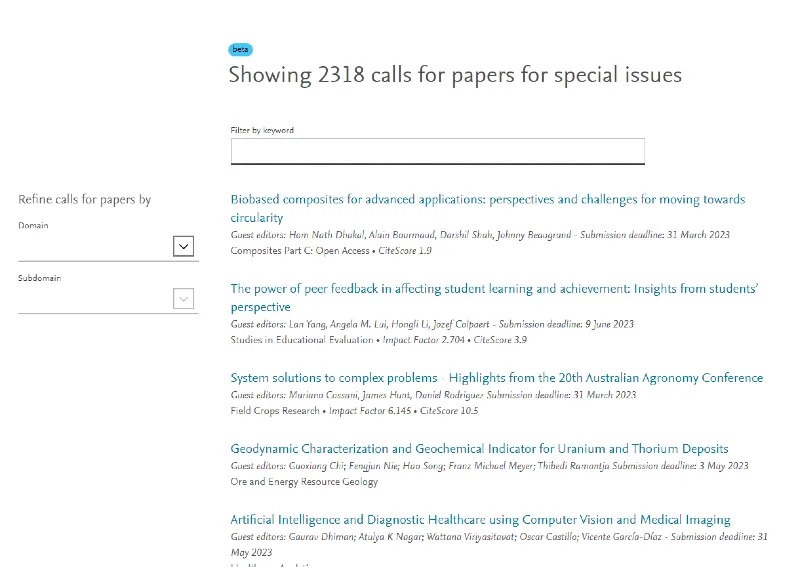Never miss out on a special issue again
January 17, 2023 | 2 min read
By Eva Weber

Introducing the Elsevier special issue browse tool
Authors might not realize that publishing their paper in a special issue can increase the impact of their research. Curated by high-profile guest editors, special issues provide an opportunity to take a deep dive into emerging trends and new discoveries. Articles published in special issues are often cited more frequently than articles published in regular issues, attracting 10% more citations than articles published in regular issues within the first 24 months of publication.* With so many journals to choose from, and new special issues being announced in different networks all the time, it can be difficult to become aware of opportunities. How do you avoid missing out on participating in an issue that could really boost your career? Enter the Elsevier call for papers browser…!
The new call for papers page(opens in new tab/window) has been developed to make it easier for authors to find special issues that align with their research. Authors can browse a list of upcoming special issues and can quickly review the entire list of special issues that are open for submissions. They can also filter using keywords, and refine the list further by domain and/or subdomain.

A screenshot of the new call for papers browse tool.
The browse tool has already proved useful and has seen praise from authors and editors alike.
"I am very impressed with the special issues call for papers page. This will certainly help authors find an appropriate special issue for their papers."
ALBDB
André Luis Branco de Barros
Professor, Biomedicine & Pharmacotherapy
The page will continue to evolve in response to user feedback. “We’ve already had a lot of positive responses and valuable suggestions and will continue to enhance the page to address authors’ needs,” explains Aleksandra Reda, Senior Product Manager. If you have any suggestions or feedback yourself, please let us know via the comments below.
Special issues are a great way for readers to keep pace with emerging topics and for authors to make their mark. To keep abreast of what’s available, then, browse the list of issues open for submission by visiting the special issue call for papers page(opens in new tab/window).
*Data sourced from Scopus and ScienceDirect comparing the performance (citations and downloads) of special content compared with that of regular articles.
Contributor

EW
Eva Weber
Marketing Program Manager at Elsevier